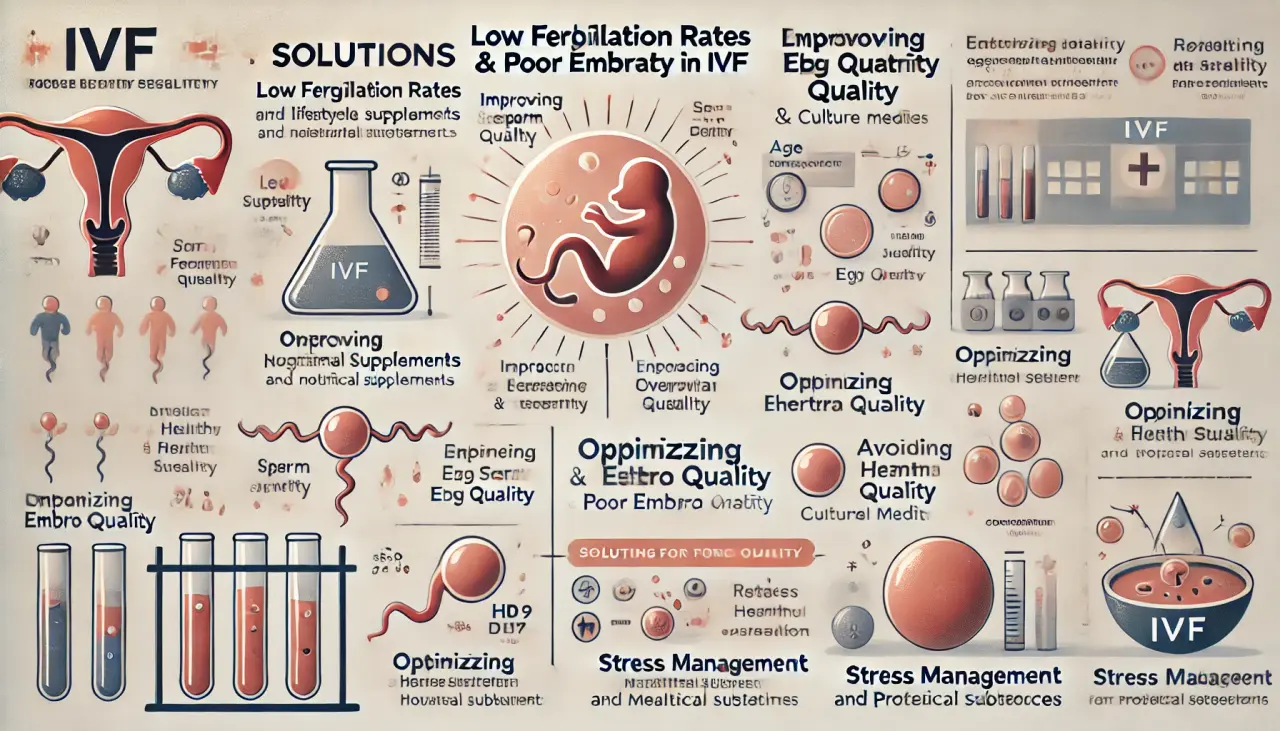
How to Improve Low Fertilization Rates & Poor Embryo Quality with IVF | Fertilization Success Tips
Infertility challenges such as low fertilization rates and poor embryo quality have become significant concerns for couples trying to conceive. These issues can be frustrating and overwhelming, but understanding their causes and solutions can improve your chances of success. In this article, we will explore how to increase fertilization success rates with IVF and provide tips to address poor embryo quality, ultimately improving reproductive health.
1. Causes of Low Fertilization Rates and Solutions
1.1 Improving Sperm Quality
Lifestyle Changes:
- Quit smoking and drinking: These habits can negatively impact sperm health and fertilization rates.
- Maintain a healthy sleep schedule: Adequate sleep is crucial for sperm vitality.
- Avoid harmful environments: Exposure to heat, radiation, and other harmful factors can reduce sperm quality.
Nutritional Supplements:
- Minerals: Zinc and selenium are vital for improving sperm motility and quality.
- Antioxidants: Vitamins like Vitamin E support sperm health and may improve fertilization rates.
Medical Interventions:
- In cases of poor sperm quality, assisted reproductive technologies such as IVF can significantly increase the chances of successful fertilization.
1.2 Enhancing Egg Quality
Age Management:
- Women’s age is directly linked to egg quality. Women are advised to consider family planning during their peak reproductive years for better fertilization outcomes.
Ovarian Stimulation Protocol:
- Consult your fertility specialist about ovarian stimulation treatments that can increase both egg quantity and quality.
Healthy Lifestyle:
- Balanced diet: A healthy diet rich in essential nutrients can improve both sperm and egg quality.
- Moderate exercise: Regular physical activity supports overall reproductive health and can boost fertilization success rates.
- Avoid extremes: Excess weight or malnutrition can impact fertility, so it’s essential to maintain a healthy weight and lifestyle.
1.3 Optimizing the Fertilization Environment
Laboratory Conditions:
- A state-of-the-art IVF laboratory with trained staff is essential to achieve high fertilization success rates and healthy embryo development.
Culture Media:
- Using cell-tested culture media ensures the materials used during the fertilization process support healthy embryo growth and do not contain harmful toxins.
2. Solutions for Poor Embryo Quality
2.1 Improving Lifestyle Habits
Diet:
- Eating foods rich in protein, vitamins, minerals, and antioxidants can enhance overall embryo health. Incorporate foods like:
- Fish
- Beans
- Nuts
- Fruits and vegetables
Sleep:
- Ensure adequate rest, as sleep is essential for maintaining hormonal balance, which is vital for both egg quality and fertilization rates.
Exercise:
- Moderate physical activity improves circulation, supports reproductive health, and may positively impact embryo quality.
2.2 Avoiding Harmful Substances
Chemicals:
- Exposure to chemicals like pesticides, formaldehyde, and industrial solvents can impair fertility and embryo quality.
Radiation:
- Limit exposure to radiation from electronics, as excessive radiation can negatively impact reproductive cells and fertilization outcomes.
2.3 Medical Assistance
Medications:
- Under medical supervision, medications like ovarian stimulants or progesterone supplements can optimize your chances of fertilization and embryo health.
Assisted Reproductive Technologies:
- IVF and embryo transfer can significantly boost fertilization success rates and improve embryo quality by providing a controlled environment for both egg and sperm.
3. Stress Management and Mindset Adjustment
Psychological Counseling:
- Consider professional support for managing fertility-related anxiety and stress. Fertility challenges can impact emotional well-being, and addressing this can improve overall reproductive health.
Relaxation Techniques:
- Techniques like meditation and yoga can reduce stress and enhance mental well-being, which may improve IVF success rates.
Cognitive Behavioral Therapy (CBT):
- CBT helps modify negative thinking and stress-related behaviors, providing mental support during the fertility journey.
4. Conclusion
Addressing low fertilization rates and poor embryo quality involves multiple factors, from lifestyle changes and medical interventions to stress management and optimizing the fertilization environment. By focusing on improving sperm and egg quality, managing stress, and exploring assisted reproductive technologies like IVF, couples can significantly improve their chances of conception. A holistic approach to both physical and mental health is essential for increasing fertilization success rates and achieving a healthy pregnancy.